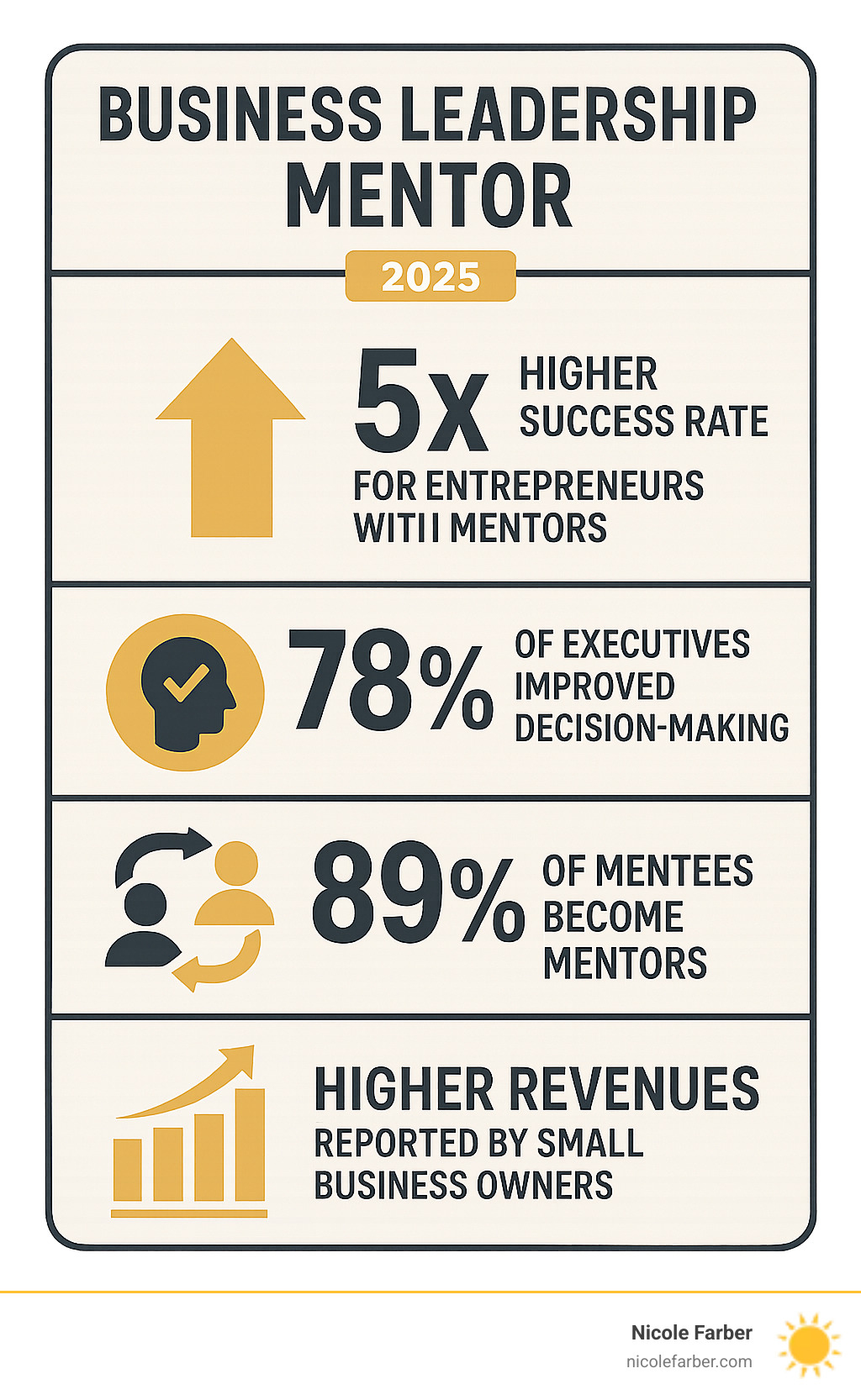The Mentor’s Edge: Unlocking Your Full Leadership Potential
- Leadership
- In the News
- September 17, 2025
Why Business Leadership Mentoring Is Your Key to Success
A business leadership mentor can be the difference between good leadership and extraordinary impact. Here’s what you need to know:
Key Benefits of Business Leadership Mentoring:
- 5x higher success rate for entrepreneurs with mentors
- 78% of executives report improved decision-making
- 89% of mentees go on to mentor others
- Higher revenues and increased growth for small business owners
- Access to proven strategies, networks, and accountability
What Makes an Effective Mentor:
- Extensive industry experience and a proven track record
- Strong listening skills and genuine enthusiasm for your growth
- Honest feedback and constructive guidance
- Willingness to share their network and open doors
- Focus on your development, not just business performance
Research consistently shows that entrepreneurs with a mentor are five times more likely to succeed. Yet many driven professionals struggle alone when they could be accelerating their growth with the right guidance.
Whether you’re building a practice in Philadelphia, expanding into new markets in New Orleans, or serving clients across Luzerne County, the challenges of leadership are remarkably consistent. The isolation at the top is real, and the pressure to make perfect decisions is constant. The need for someone who’s “been there before” becomes critical as stakes get higher.
As Nicole Farber, I’ve spent over 15 years helping businesses steer complex growth challenges. I’ve seen how the right business leadership mentor transforms careers and organizations. My experience has taught me that great leaders aren’t born—they’re developed through guidance, accountability, and strategic support.

The Transformative Power of a Business Leadership Mentor

When facing a tough decision, a business leadership mentor can be your secret weapon. A mentorship is more than just advice; it’s a relationship with a trusted guide who has walked the path before you and is invested in your success. Your mentor acts as a sounding board, an emotional support, and an accountability partner, helping you see blind spots and fuel your growth.
This powerful relationship creates a ripple effect. As you grow, your team grows with you, leading to improved decision-making, higher growth rates, and increased revenue.
More info about our Business Leadership Strategies
What is a Business Leadership Mentor?
A business leadership mentor is an experienced professional who shares real-world wisdom to help you succeed. They act as a guide, an experience-sharing partner, and a personal development coach who sees your untapped potential.
Great mentoring is about personal investment. As Harvard Business Review notes, the best mentors see the masterpiece within and help reveal it. They aren’t trying to create a copy of themselves; they’re helping you become the best version of you. Whether you’re in Philadelphia or New Orleans, a great mentor provides tools that work across markets.
Key Benefits for Leaders and Organizations
Investing in a business leadership mentor yields significant returns. For leaders, this includes:
- Improved leadership skills: Develop strategic thinking and inspiring communication.
- Expanded professional network: Gain access to new opportunities and connections.
- Increased confidence: Make bold decisions with the backing of a trusted advisor.
- Objective feedback: Receive honest, supportive guidance that’s hard to find at the top.
Organizations also benefit from:
- Higher employee retention: Mentored leaders create better work environments.
- A stronger leadership pipeline: Skills are passed down, developing future leaders.
Data supports this: 78% of executives report improved decision-making through mentorship, leading to smarter strategies and fewer costly mistakes.
Mentoring vs. Coaching: Understanding the Difference
While both are valuable, a business leadership mentor and a coach serve different roles.
| Feature | Business Leadership Mentoring | Business Coaching |
|---|---|---|
| Focus | Overall personal and professional development | Specific business performance and tasks |
| Relationship | Long-term, evolving partnership | Short-term, project-focused engagement |
| Agenda | Development-driven and flexible | Task-driven with structured objectives |
| Goal | Empowerment and wisdom transfer | Optimization and performance improvement |
A mentor focuses on your entire leadership journey and personal growth, fostering deep, lasting change. A coach is geared toward achieving specific business goals in a set timeframe. Whether you’re in Wilkes-Barre or Luzerne County, the personal foundation from mentorship supports all your professional goals.
How to Find and Secure Your Ideal Mentor

Finding the right business leadership mentor is a strategic process. Start with self-reflection: What are your biggest challenges and long-term goals? Whether you’re expanding a firm in Philadelphia or managing a team in New Orleans, clarity on your needs will help you identify the right guide.
Great mentors exist everywhere, from busy cities to the quieter communities of Luzerne County. You just need to know what to look for and how to approach them.
More info on How to Become an Effective Leader
Essential Characteristics of an Effective Business Leadership Mentor
Not all successful leaders make great mentors. Look for these key qualities:
- Relevant Experience: They’ve weathered storms, learned from mistakes, and can share real-world stories.
- Empathy and Active Listening: They listen to understand and remember what it was like to be in your shoes.
- Honesty: They provide constructive feedback, caring more about your growth than your immediate comfort.
- Enthusiasm for Your Success: They are genuinely invested in your journey and celebrate your wins.
- Willingness to Share: They open doors by sharing their network and hard-earned lessons.
Where to Look for Your Mentor
Your ideal business leadership mentor could be closer than you think. Explore these avenues:
- Your Professional Network: A former boss or respected colleague could be a perfect fit.
- Industry Events: These are goldmines for connecting with experienced professionals.
- LinkedIn: Research leaders who inspire you and understand their perspectives before reaching out.
- Formal Mentoring Programs: Professional associations often have structured matching programs.
- Local Business Communities: In places like Philadelphia or Wilkes-Barre, groups like the Chamber of Commerce connect emerging and seasoned leaders. Even in markets like Antigua Guatemala, local associations are a great resource.
- Community Organizations: Groups like Rotary Clubs attract successful professionals committed to giving back.
Making the Ask: How to Approach a Potential Mentor
Once you’ve identified a potential mentor, approach them thoughtfully:
- Do Your Research: Understand their background and recent work to show genuine interest.
- Seek a Warm Introduction: A mutual connection is the best way to make contact.
- Be Clear and Concise: Be specific about why you’re reaching out. Instead of a vague “Can you mentor me?” try asking for a brief conversation about a specific area where you need guidance.
- Respect Their Time: Suggest a short, specific commitment, like a 20-minute coffee chat.
- Prepare Your ‘Why’: Know exactly why you chose them and what you hope to learn. This shows you’re serious and value their expertise.
Building and Maximizing the Mentoring Relationship
Securing a business leadership mentor is the first step; nurturing the relationship is where the magic happens. A successful partnership is an active, collaborative effort built on trust and clear communication.
More info on Women Entrepreneur Coaching
Best Practices for a Successful Partnership
To maximize your mentoring relationship, adopt these best practices:
- Establish Clear Goals: Agree on the purpose, goals, and meeting frequency from the start.
- Show Mutual Respect: Value your mentor’s time and insights.
- Meet Regularly: Consistency is key. Schedule meetings in advance and come prepared.
- Communicate Openly: Be transparent about your challenges and successes.
- Be Proactive: As the mentee, you are responsible for driving the relationship.
- Celebrate Successes: Acknowledge the guidance you receive and share your wins.
- Know When to Evolve: Understand that relationships change. When goals are met, the partnership may evolve or conclude.
How Mentees Can Drive the Relationship’s Success
The mentee’s role is critical. To get the most out of the relationship:
- Be Prepared: Come to meetings with questions, updates, and topics for discussion.
- Ask Thoughtful Questions: Seek to understand the ‘why’ and ‘how’ behind their advice.
- Be Open to Feedback: Welcome constructive criticism as a tool for growth.
- Take Initiative: Actively work on your development instead of waiting for direction.
- Follow Through: Complete any action items to build trust and show accountability.
- Show Gratitude: Regularly express your appreciation for their time and guidance.
- Provide Value Back: Share fresh perspectives or relevant articles to make the relationship mutually beneficial.
Common Mistakes to Avoid
Steer clear of these common pitfalls that can derail a mentoring relationship:
- Unclear Goals: A lack of purpose leads to frustration.
- Poor Communication: Unresponsiveness or a lack of transparency erodes trust.
- Disrespecting Time: Being late, canceling last-minute, or showing up unprepared is disrespectful.
- Passive Participation: Expecting your mentor to provide all the answers. You must do the work.
- Fearing Vulnerability: Hiding struggles prevents your mentor from offering the best advice.
- Expecting Sponsorship: A mentor may eventually sponsor you, but it must be earned, not expected.
- Ignoring Advice: Consistently disregarding guidance signals a lack of commitment.
The Mentor’s Impact on Growth and Talent Development

The impact of a business leadership mentor extends far beyond the individual, creating organizational change that can reshape a company’s future. From Philadelphia to New Orleans, I’ve seen how mentoring builds the architects of tomorrow’s success. Mentors invest in people who will lead teams, make critical decisions, and shape company culture for years.
More info on our Leadership Development Seminars
Developing Future Leaders and Driving Business Growth
A business leadership mentor molds the next generation of leaders by developing capabilities that drive growth:
- Strategic Thinking: Mentors guide mentees through real-world scenarios, helping leaders in places like Wilkes-Barre and Luzerne County learn to evaluate risk and focus on long-term success.
- Emotional Intelligence: Mentees learn by observing how their mentor handles difficult conversations and manages pressure, building resilience.
- Navigating Organizational Politics: A mentor provides insights on managing stakeholders and understanding unspoken dynamics, a crucial skill whether you’re in New Orleans or Antigua Guatemala.
- Inspiring Innovation: Mentors push mentees outside their comfort zones, asking hard questions that spark creativity and encourage calculated risks.
The Role of Mentoring in Succession Planning and Talent Development
Mentorship is an insurance policy against leadership gaps, creating a steady pipeline of talent. It’s a cornerstone of effective talent development.
- Identifying High-Potential Employees: Experienced mentors can spot future leaders who have the right combination of skill, aspiration, and commitment.
- Knowledge Transfer: Critical experience and institutional knowledge are passed down through stories and shared problem-solving, which is vital during times of change.
- Fostering Loyalty: Employees who feel invested in are more likely to stay, grow, and mentor others, creating a positive cycle.
Another powerful tool is reverse mentoring, where junior employees mentor senior leaders on new technologies or trends. This bridges generational gaps and keeps leadership connected. Mentorship creates leaders who value developing others, making talent development part of the company’s DNA.
Frequently Asked Questions about Business Leadership Mentoring
The journey with a business leadership mentor raises many questions. For leaders from Philadelphia to New Orleans, here are answers to the most common ones.
How much time does a typical mentoring relationship require?
Mentoring relationships are flexible. While meeting once or twice a month for an hour is a good starting point, the frequency can adapt to your needs. Some relationships last for years, evolving from weekly calls during a critical phase to quarterly check-ins later on.
The key is consistency. Whether you’re in Luzerne County or Antigua Guatemala, that regular connection is a powerful investment in your future.
Can a mentor help me if they are in a different industry, like legal marketing?
Absolutely. Sometimes, an outside perspective is exactly what you need. Leadership challenges like making tough decisions, building teams, and navigating growth are universal. A mentor from a different field can offer fresh insights and challenge industry assumptions.
What matters most is their understanding of leadership, their wisdom, and their genuine investment in your success, not their specific industry knowledge.
What is the single most important thing I can do to make my mentorship successful?
Be coachable and take ownership of your growth. Your mentor is a guide, not a problem-solver. The most successful mentees are those who show up prepared, listen deeply, and implement what they learn.
This means being honest about your struggles, following through on commitments, and treating your mentor’s time as the precious gift it is. Your mentor is investing in your potential; show them they’re right by actively driving your own development.
Conclusion: Your Journey to Exceptional Leadership Starts Now
The path to extraordinary leadership doesn’t have to be traveled alone. A business leadership mentor can transform your career and your entire approach to leadership. The evidence is clear: entrepreneurs with mentors are five times more likely to succeed, and 78% of executives report improved decision-making.
This is about more than skills; it’s about empowerment and continuous learning. It’s about gaining the confidence to make bold decisions, whether you’re leading a team in Philadelphia or building a business in New Orleans. The mentor’s edge is the strategic advantage that separates good leaders from great ones, creating lasting impact in organizations from Wilkes-Barre to Antigua Guatemala.
Your full potential is waiting to be released. The most successful leaders understand that seeking guidance is a sign of strength, not weakness.
As someone who has walked the challenging path of building a business while raising a family, I know how isolating leadership can be. The strongest leaders are those who recognize they don’t have to carry that weight alone.
Take the first step. The right mentorship can accelerate your growth in ways you never imagined. Your future self—and your organization—will thank you for it.
Explore more on leadership and book a consultation

